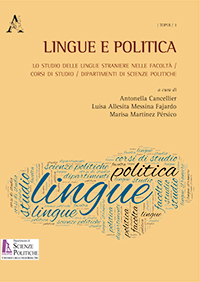Estratto da
LINGUE E POLITICA
Lo studio delle lingue straniere nelle Facoltà / Corsi di Studio / Dipartimenti di Scienze Politiche
Análisis y traducción al italiano del Diario de Sesiones
LINGUE E POLITICA
Lo studio delle lingue straniere nelle Facoltà / Corsi di Studio / Dipartimenti di Scienze Politiche
Análisis y traducción al italiano del Diario de Sesiones

En este artículo se aplican los postulados de la lexicología contrastiva de Robert Lado al estudio del lenguaje político español e italiano. Los términos propuestos provienen principalmente del Diario de Sesiones del Congreso de los Diputados, a ellos siguen las traducciones italianas. En este estudio nos ocuparemos, pues, de los falsos amigos “evidentes” y sobre todo de los “ilusorios” entre el lenguaje político italiano y español. Además queremos hacer notar que el mecanismo de transferencia de un idioma a otro de las palabras compuestas y alteradas no es siempre automático ya que entre dos lenguas semejantes se puede hablar de homología y no de identidad.
In this article the postulates of contrastive linguistic are applied to the study of Italian and Spanish political language. Most terms proposed are extracted from the Diario de Sesiones del Congreso de los Diputados and at these terms follow the italian translations. So, in this study we deal with the “false friends” (most of all are “illusory” ones) between the Spanish and the Italian political languages. Moreover, we’ll try to point out that the transfer mechanism from one language to another of compound and modified words, is not always automatic, especially when the two languages are similar; in fact in this case one can refer to homology but not to identity.
In this article the postulates of contrastive linguistic are applied to the study of Italian and Spanish political language. Most terms proposed are extracted from the Diario de Sesiones del Congreso de los Diputados and at these terms follow the italian translations. So, in this study we deal with the “false friends” (most of all are “illusory” ones) between the Spanish and the Italian political languages. Moreover, we’ll try to point out that the transfer mechanism from one language to another of compound and modified words, is not always automatic, especially when the two languages are similar; in fact in this case one can refer to homology but not to identity.
| pagine: | 143-161 |
| DOI: | 10.4399/978885489113510 |
| data pubblicazione: | Giugno 2016 |
| editore: | Aracne |








